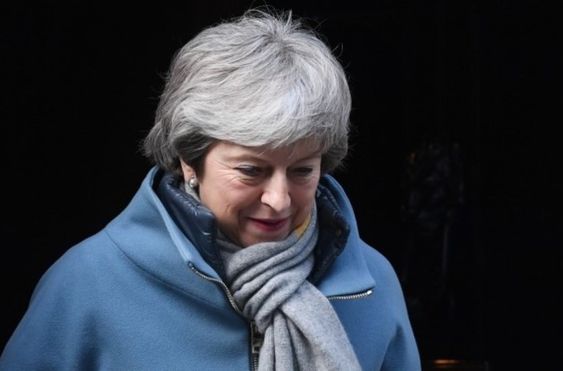
Brexit: Theresa May urged to quit to help deal pass
Theresa May could gain support for her Brexit deal if she promises to stand down as prime minister, senior Conservatives have told the BBC.
MPs in the party have said they might reluctantly back the agreement if they know she will not be in charge of the next stage of negotiations with the EU.
Advertisement
But the chancellor said changing prime ministers "wouldn't help", adding: "This isn't about individuals."
No 10 has dismissed reports that Mrs May could be persuaded to stand aside.
Newspapers claim cabinet ministers are plotting a coup against the prime minister, aiming to replace her with a caretaker leader until a proper leadership contest is held later in the year.
But there are differing accounts of who the preferred candidate is, with the Brexiteer and Remain wings of the party said to disagree.
'Self-indulgent'
The prime minister has come under growing pressure to quit following a week in which she was forced to ask the EU for an extension to Article 50, and criticised for blaming the delay to Brexit on MPs.
The withdrawal deal she has negotiated with the EU has been overwhelmingly rejected in the Commons twice, and it remains unclear whether she will bring it back a third time next week after she wrote to MPs saying she would only do so if there was "sufficient support".
Chancellor Philip Hammond told Sky's Sophy Ridge on Sunday: "This is not about the prime minister… changing prime ministers wouldn't help, changing the party of government wouldn't help."
He denied reports he was hoping to parachute in Mrs May's de facto deputy, David Lidington, as caretaker, adding: "To be talking about changing the players on the board, frankly, is self indulgent at this time."
Mr Hammond said he understood MPs were "very frustrated", but "one way or another Parliament is going to have an opportunity this week to decide what it's in favour of".
'Caretaker leader'
The Sunday Times reports that Mr Lidington, who voted Remain, is being lined up to replace Mrs May, while the Mail on Sunday said the Brexiteer Environment Secretary Michael Gove was the "consensus choice".
But one senior backbencher told the BBC's Iain Watson that even standing aside would not be enough for her deal to be voted through, and that Mrs May might as well "dig in".
No 10 has also dismissed suggestions that she would agree a "job share" arrangement where senior ministers would be given extra responsibilities.
The BBC's political editor, Laura Kuenssberg says there is "serious manoeuvring" going on.
Former Conservative leader Iain Duncan Smith said the EU's decision to dismiss Mrs May's request to delay Brexit until 30 June and insist on its own timetable instead was "as close to being humiliated as any prime minister I've ever seen in Britain".
The prominent Brexiteer also told the BBC's Andrew Marr the disloyalty some cabinet ministers were showing to her was "appalling".
They should be censured, sacked, or at the very least "they should be apologising and they should shut up," he added.
The leadership row comes ahead of a week where the PM is expected to lose further control over the Brexit process.
A cross-party group of MPs will press for alternatives to her deal to be debated on Wednesday - something government sources expect to happen.
In the coming days, as many as six other options, in addition to Mrs May's deal, could be voted on in order to see which are most popular - so-called indicative votes. They are:
Revoking Article 50 and cancelling Brexit
Another referendum
The PM's deal plus a customs union
The PM's deal plus both a customs union and single market access
A Canada-style free trade agreement
Leaving the EU without a deal
Mr Hammond said he would remove revoking Article 50 and a no-deal Brexit from the list, as "both of those would have very serious and negative consequences for our country".
On the subject of a second referendum, he said: "It is a coherent proposition and deserves to be considered, along with the other proposals."
When asked whether MPs would get free votes on the propositions, Mr Hammond said it was something the government had not yet decided on, but Parliament had to come together and say what form of Brexit it is willing to accept.
A free vote means ministers and MPs can make their own mind up rather than following the orders of party whips - an unusual and rare move for a vote on a major policy.
On Saturday hundreds of thousands of people marched in central London to call for another EU referendum.
Protesters carrying EU flags and placards called for any Brexit deal be put to another public vote, with speakers including Labour's deputy leader Tom Watson, Scotland's First Minister Nicola Sturgeon, and London Mayor Sadiq Khan.
Organisers said the initial count showed more than a million people had turned up - putting it on a par with the biggest march of the century, the Stop the War march in 2003.
Meanwhile, the woman behind a record-breaking anti-Brexit petition, retired lecturer Margaret Georgiadou, said she had received death threats over the poll.
Next steps
Earlier in the week, European leaders agreed to delay the UK's departure from the EU until at least 12 April, from 29 March.
If Mrs May's deal is approved by MPs next week, the EU has agreed to extend the Brexit deadline until 22 May.
If it is not - and no alternative plan is put forward - the UK is set to leave the EU on 12 April.



